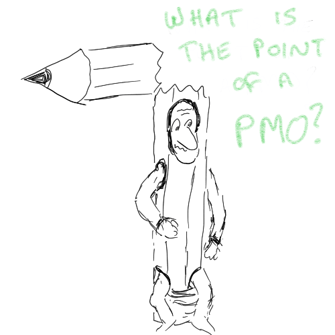What's the point of a PMO?
Updated:
Published:
 So, you've probably heard the one about the broken pencil?
So, you've probably heard the one about the broken pencil?
....nah, there's no point.
Maybe that's really a joke about PMOs. You've seen the stats, right?
- 50% of PMOs close within 3 years (APM)
- Since 2008, PMO implementation failure rate is over 50% (Gartner Project Manager 2014)
- 68% of stakeholders perceive the PMO as bureaucratic (2013 Gartner PPM Summit)
I've written before on ways to turn this around, but there's one underlying challenge: many PMO leaders themselves don't understand the point of the PMO. If the PMO leader doesn't know what the PMO is for, how can the senior executives value it?
The point of a PMO
So what is the point of the PMO?
Go on, stop reading for a second and write down your idea of what the point of the PMO is.
Now you've written your answer, let me give you mine. There is only one point of the project portfolio, and therefore of the PMO. And the answer starts by asking what your organization is for. I don't mean the PMO, I mean the company you work for, the government department or non-profit. That organization exists to deliver value to its stakeholders.
A company delivers a return to its shareholders by serving its customers. A government department exists to deliver services to the populace and a non-profit serves its "customers'" needs.
But your organization exists in a world of change. Customers change, laws change, technology changes and your organization has to keep up. If it's to continue to meet its strategic goals, it must change.
And that's what the portfolio is for. The sole purpose of the portfolio is to deliver strategic value.
Which means that the purpose of the PMO, the ONLY purpose of the PMO, is to help the project organization to deliver more value.
How can a PMO fulfill its purpose?
I was invited to speak at the PMO IMPACT Summit and as a warm-up act, I just recorded a webinar on "How can a PMO increase its impact?".
In summary, there are only two levers you can pull. First, you can make sure you're working on the right things. Second, you can improve the way you execute projects.
Many PMOs focus so much on the second point, project execution, that they start to become the Project Police. They're so busy implementing templates and making sure everyone ticks boxes that they forget they are there to add value.
And many ignore the first, making sure they're working on the right projects, point altogether.
This is a shame because;
1) if the PMO doesn't focus on the project selection process, nobody else will,
2) sorting this stuff out is a quick and easy win.
And when you're done, why not spend a few minutes thinking about what you might do differently. What action can you take to make sure your PMO is adding value.
